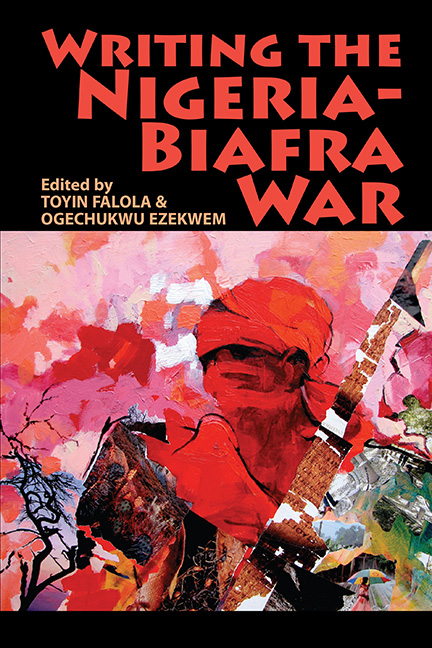Book contents
- Frontmatter
- Contents
- Notes on Contributors
- List of Abbreviations
- Timeline
- Map of Biafra 30 May 1967 – 1 May 1969
- 1 Scholarly Trends, Issues, and Themes: Introduction
- Part I On The History Of The Nigeria-Biafra War
- Part II Critical Debates On The Nigerian Crisis
- Part III The War In Fiction, Memoir, And Imagination
- Part IV Locating Gender In Nigeria-Biafra War Literature
- Select Bibliography
- Index
17 - Neo-Colonialism, Biafra, and the Causes of War as Imagined in Buchi Emecheta’s Destination Biafra
Published online by Cambridge University Press: 17 June 2021
- Frontmatter
- Contents
- Notes on Contributors
- List of Abbreviations
- Timeline
- Map of Biafra 30 May 1967 – 1 May 1969
- 1 Scholarly Trends, Issues, and Themes: Introduction
- Part I On The History Of The Nigeria-Biafra War
- Part II Critical Debates On The Nigerian Crisis
- Part III The War In Fiction, Memoir, And Imagination
- Part IV Locating Gender In Nigeria-Biafra War Literature
- Select Bibliography
- Index
Summary
Introduction
Emecheta is mostly known for her novels reflecting on the domestic sphere, on women's lives, and issues of marriage and children. Regrettably, Destination Biafra, her novel on the war, seems to have been largely ignored. Described in the author's foreword as ‘a historical fiction’ which ‘simply had to be written’, the work follows the long journey of Emecheta's dream character Debbie from Lagos to the heart of Biafra, a journey that both reveals the various sides of the war and deeply transforms Debbie's character and viewpoint. This chapter will consider the novel's presentation of the war through its using thinly veiled historical characters and events as a background, the novelist's reflection on the causes of the conflict, and her presentation of the role neo-colonialism and ethnic realities played in the conflict to show its unique contribution to the Biafran War literature.
A Novelist on History
The Biafran War, which ‘reflects the divisions between the various ethnic groups carelessly yoked together in the colonial construction of Nigeria’ has been a defining moment in Nigeria's contemporary history. It has also generated an impressive number of books, ‘a largely Igbo tradition’, with Adichie and Emecheta being the only female authors to represent that conflict within a larger historical context in their novels. Emecheta's novel, described as ‘a bold and daring departure from the normal domestic preserve of most fictional works of African women writers’, is however unique on two counts: for its author's interest in the country's pre-war politics and for her overt criticism of the Biafran stance. Within the confines of her text, she ‘dramatizes 12 years of political mismanagement, civil commotion, personal and communal greed, unabated selfishness and corrupt leadership which lead ultimately to social chaos, deprivation and death’. Yet the only major book on Emecheta, edited by Umeh in 1996, devotes only two chapters to Destination Biafra, while Porter and Sumalatha regret the ‘prominent absence’ of that novel from ‘most critical discussions of the war novel in Africa’.
For Morrison, Destination Biafra is the only novel ‘highly specific in its historical engagements’ including ‘explicit meditations on the nature of justice of the Biafran project’, ‘more committed and more detailed in its political and ideological analysis than many other texts of the genre’, going beyond the ‘documentation of suffering’ and looking at the situation from a distance to better grasp events which led to the war.
- Type
- Chapter
- Information
- Writing the Nigeria-Biafra War , pp. 361 - 379Publisher: Boydell & BrewerPrint publication year: 2016

